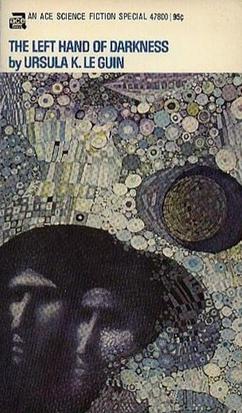
The Left Hand of Darkness is a wonderfully dense novel with layers and layers of beautifully imagined landscapes, poignant social commentaries and political intrigue. It draws from an array of styles to deliver a unique and enthralling tale. Though it’s not the strength of the narrative that makes this novel so extraordinary; rather it’s the thought experiment that Ursula K. Le Guin constructs on how society is remarkably influenced by biological sex and gender. She masterfully constructs a stage to reveal how the perception of gender affects our understanding of the world.
Design
The novel primarily follows the envoy Genly Ai, who is sent to the planet of Winter—called Gethen by its inhabitants—to incorporate the world into the existing interplanetary coalition of the Eukamen. To the confusion of the inhabitants of Winter, Genly Ai is sent alone, yet tasked with the daunting mission of convincing the kingdoms of Winter to join this alien coalition. The book is structured as a report submitted to the Eukamen, largely composed of chronological first-person narratives of events that took placed during his time on Winter. Taken from the novel’s opening line:
“I’ll make my report as if I told a story, for I was taught as a child on my homeworld that Truth is a matter of the imagination.”
Dispersed throughout the story are also a few journal entries written by Estraven, the Prime Minister of the kingdom of Karhide, as well as short myths that depict important aspects of Winter’s society and history.
Writing
Le Guin’s prose is dense and precise:
“It doesn’t do to be impatient in Karhide. They are anything but a phlegmatic people, yet they are obdurate, they are pertinacious…”
Every detail is meticulously calculated, from the stunning landscapes of Winter to the streams of consciousness flowing out of the minds of the main characters. It may take reading through the first chapter before really picking up on her prose, but its clarity and attention to detail allow Le Guin to seamlessly convey complex thoughts and perspectives without breaking the natural flow of the story.
Thoughts
Although Le Guin tackles many ideas throughout the novel, there is a clear focus for which the novel has become well known: how would society be different if we didn’t have a fixed biological sex? The people of Winter are androgynous, sexually dormant until a recurring period of kemmer where they are sexually active for a brief duration, measured in lunar cycles. Biological sex is temporarily set before sexual activity, determined by the relationship with the partner, whereupon it reverts back to a neutral state after coitus. What effects would this have on society, if—for example—anybody could have a child? With this concept in mind, it’s crucial to focus on how Genly Ai’s perception of the people of Winter change throughout the novel. As he comes from a society such as ours, he often misunderstands or misinterprets the actions or intentions of the androgynous people of Winter.
Throughout The Left Hand of Darkness, Le Guin seems to focus on the perception that people have on others, aligning with her background in anthropology. She uses the two quarreling kingdoms of Karhide and Orgoreyn to analyze and provide insight into our perspectives of the other:
“No, I don’t mean love, when I say patriotism. I mean fear. The fear of the other. And its expressions are political, not poetical: hate, rivalry, aggression. It grows in us, that fear. It grows in us year by year. We’ve followed our road too far. And you, who come from a world that outgrew nations centuries ago, who hardly know what I’m talking about, who show us the new road-”.
She comments on the propaganda diffused by governments, more prominent at the time this novel was written, yet just as relative today—where it is simply hidden behind the veneer of liberal democracy:
“Tibe spoke on the radio a good deal…and it was not in the Karhidish vein: their government was a not a public performance, normally; it was covert and indirect. Tibe, however orated…His speeches were long and loud: praises of Karhide, disparagements of Orgoreyn, vilifications of “disloyal factions,” discussions of the integrity of the Kindom’s borders,” lectures in history and ethics and economics, all in a ranting, canting, emotional tone that went shrill with vituperation or adulation…I decided that he was deliberately avoiding talk of [personal pride or prestige] because he wished to rouse emotions of a more elemental, uncontrollable kind…He wanted his hearers to be frightened and angry. His themes were not pride and love at all, though he used the words perpetually; as he used them they meant self-praise and hate. He talked a great deal about Truth also, for he was, he said, “cutting down beneath the veneer of civilization.”
Final Review
The Left Hand of Darkness is a distinguished novel, displaying a meticulous thought experiment while building a captivating world that engages the reader. The planet of Winter is a beautifully imagined, ice-covered wonderland that makes you appreciate Le Guin’s imagination and literary mastery. The novel draws from various types of works, from seemingly space opera beginnings to an adventure story woven together with political intrigue. Although the storyline itself is not overly innovative, the poignant social and political commentary makes it a truly compelling read.